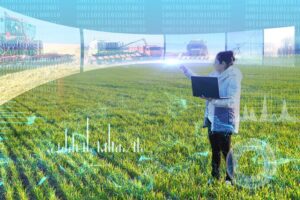
In the ever-evolving landscape of agriculture, integrating digital tools and cellphone apps has ushered in a new era of precision farming and plant disease management. Scientists and academics are at the forefront of this technological revolution, leveraging these innovations to enhance food production, optimize resource utilization, and combat plant diseases more effectively than ever before. This blog post will explore the profound implications of digital tools and cellphone apps for researchers and academics in agriculture.
- Precision Agriculture: Maximizing Crop Yield
Digital tools and smartphone apps have enabled scientists and researchers to implement precision agriculture techniques with unparalleled accuracy. These tools collect and analyze vast data, including soil composition, weather patterns, and crop health indicators. Academics can then harness this data to make data-driven decisions about planting, irrigation, and fertilizer application.
For instance, apps like SoilGrids provide detailed soil information, allowing scientists to tailor nutrient management plans to the specific needs of each field. This level of precision not only maximizes crop yield but also minimizes the environmental impact of agriculture by reducing the overuse of resources.
- Plant Disease Management: Early Detection and Mitigation
Plant diseases pose a significant threat to global food security. With the help of digital tools and smartphone apps, scientists and researchers can detect and combat these diseases more efficiently. Mobile apps like Plantix use image recognition technology to identify and diagnose plant diseases based on photos uploaded by farmers or researchers. Academics can access vast databases of plant disease information to aid in early detection and targeted treatment.
Furthermore, real-time disease monitoring systems, such as IoT-enabled sensors and remote sensing technologies, provide continuous data on crop health. This allows academics to implement proactive disease management strategies, reducing crop losses and the need for chemical interventions.
- Data-Driven Research and Collaboration
Digital tools and cellphone apps have revolutionized data collection and sharing among scientists and academics. Researchers can easily collect data in the field using mobile apps and synchronize it with cloud-based platforms. This seamless integration facilitates collaborative research across institutions and geographical boundaries.
Moreover, machine learning algorithms can analyze massive datasets digital tools generate to uncover valuable insights. Scientists can use these insights to develop new crop varieties, disease-resistant strains, and sustainable farming practices.
- Education and Extension Services
Integrating digital tools in agriculture also benefits educational institutions and extension services. Smartphone apps can be powerful tools for disseminating knowledge to farmers and agricultural professionals. Scientists and academics can develop apps that provide information on best practices, disease management strategies, and market trends, ensuring the agriculture community stays updated and informed.
Digital tools and cellphone apps have become indispensable assets in the arsenal of scientists and academics involved in agriculture. These technologies have elevated precision farming to new heights, facilitated proactive disease management, streamlined research, and empowered educational initiatives. As we continue to harness the potential of these innovations, we can look forward to a future where agriculture is more productive, sustainable, and resilient in the face of global challenges. Scientists and academics must embrace these digital tools and collaborate on pioneering research to shape the future of food production and plant disease management.
